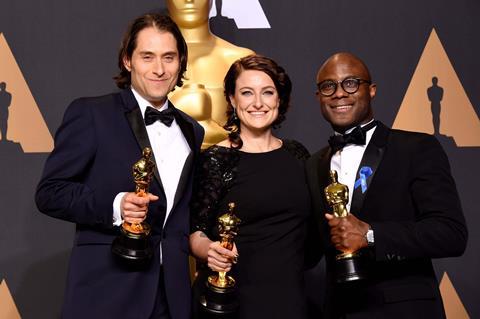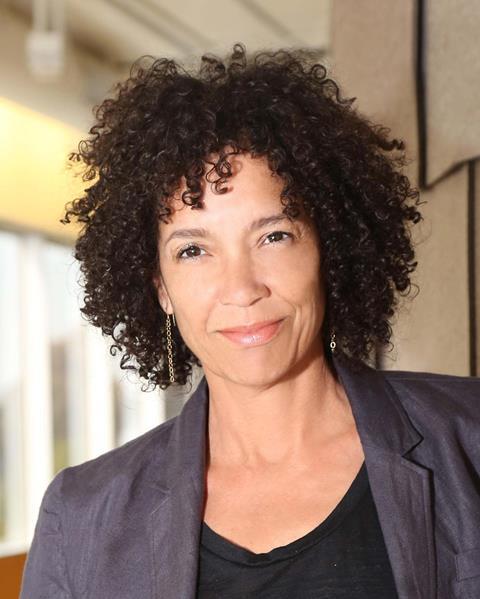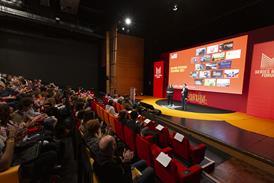Without an official union, US producers are lobbying in different ways to improve their representation.

Times are tough for everyone working in the US film business, thanks to Covid, the strikes and cutbacks at many of the industry’s significant players. But US producers, whether they make films for the studios, the streamers or in the independent sector, face particular challenges that, they suggest, have made it increasingly hard to sustain careers, build their businesses and foster a new generation of producing talent.
Producers “have taken the brunt of the constriction”, says Stephanie Allain, who besides being an active producer serves as co-president of the Producers Guild of America (PGA).
In response, several groups are now pushing to protect producers’ rights and correct what they see as a degradation of the working producer’s role in a significantly changed industry environment. The PGA, a non-profit trade organisation with 8,400 members working in a wide range of producing categories and sectors, has been promoting producers’ interests for more than 60 years, with current efforts including initiatives on health insurance and credits.
This summer, the guild secured commitments from 20 more companies – adding Amblin Entertainment, Fremantle, Illumination and others to previous participants including Blumhouse and Legendary – to make health insurance provisions available to more working producers. (The studio and streamer members of the Alliance of Motion Picture and Television Producers are required to provide health coverage on their projects, but only for a handful of producing titles.)
The guild also recently doubled down on its effort to clarify the producer’s job by updating its Code of Credits and revising the rules for awarding its Producers Mark – the ‘p.g.a.’ tag added to selected names in feature film credits designating which producers are awards eligible. Such clarification can have financial as well as other implications in an environment where producers sometimes have to share their fees with actors or directors who want a producing credit in exchange for signing on.
“The bottom line is, who’s going to get that producer’s fee,” explains Allain, whose credits include Hustle & Flow and recent Sundance entry Exhibiting Forgiveness. “We’re ending up with the smallest amount [but] still doing the giant amount of work.”
Other PGA initiatives support sustainability, production incentives and mentoring. Since the mid-1970s, however, the Guild has been legally restricted from acting as a union and negotiating collective bargaining agreements in the same way the US industry’s writers, directors and actors guilds can. The producer’s group has sought recognition as a union several times over the past 50 years, but so far without success.
Recognition as a collective bargaining organisation was the goal nearly four years ago when around 100 independent US producers formed Producers Union. In 2022, the group drew up a basic agreement proposal – covering minimum salary levels, development fees, healthcare contributions and other terms – that it planned to share with potential signatory companies.
Whether any companies agreed to become signatories is not clear, however, and the group’s co-presidents did not respond to requests for an interview.
Challenge focus

The newest and highest-profile group to join the producers’ rights push is Producers United, a collective of what it calls “career producers”, numbering around 130 and including such highly regarded industry names as Barbara Broccoli, Christine Vachon, Jason Blum, Lorenzo di Bonaventura, Dede Gardner and Neal H Moritz (as well as several of the founding members of Producers Union).
So far, Producers United has focused its attention on specific challenges faced by producers: getting payment for their work during film and TV project development periods, which can last for years before resulting in a greenlight and a producing fee, and getting health insurance contributions during pre- and post-production as well as production itself.
Because it is not a union and cannot collectively bargain, the group has held discussions with individual studios and secured separate commitments from Warner Bros Discovery, Disney, Paramount, Universal and HBO.
Details of the commitments have not been revealed but producer Cathy Schulman, a member and one of the founders of Producers United, says the studio discussions were “much more about a mental shift. They got the idea that we need to have spaced-out payments, in the same way that writers are paid per draft, or rights-holders are paid for option periods.
“Studios and streamers do acknowledge that they need experienced career producers to manage their investments [in film and TV projects] from start to finish,” continues Schulman, whose credits include Crash and The Woman King.
Now Producers United is holding discussions with streamers and mini-major players, hoping to secure another round of commitments in the new year. With independents, says Schulman, “the numbers may be adjusted. But the idea that people have to be paid when they work has to be adopted industry-wide.”
All of the producers’ rights groups take pains to point out that their efforts are not being made purely out of self-interest, but also to ensure producing will be a viable career option for young people with new ideas and diverse backgrounds.
“What we’re doing is not only for people who are part of our membership group,” insists Schulman. “We are trying to do this for all career producers, whether they’re experienced or not. We are doing this for the next generation.”
The groups also argue that a better deal for producers in areas such as payment scheduling and health insurance will mean a better, more diverse industry output. Producers who are not paid properly to develop content are forced to spread themselves over multiple projects, the groups suggest, risking a diminution of focus on each one.
Producers United and the PGA, both of which say they have many members in common, also insist that they are fully supportive of each other’s efforts.
“They have talked to us and we have talked to them,” reports Donald De Line, producer of films including The Italian Job and Ready Player One, who is Allain’s co‑president at the PGA. “We are supportive of anything that contributes to the betterment of a career and a life for producers. A rising tide lifts all boats – that’s the way we feel about it.”
Where the producers’ rights push might lead, meanwhile, remains uncertain. Becoming a legally recognised producers’ union could be tricky for both the PGA and Producers United.
But at the latter group, says Schulman, “We have to keep evaluating unionisation as an option. We hope we can continue to collaborate with the financiers who are our partners and do something constructively and not have to go down the necessarily long road of unionisation. But traditionally in this country, if you can’t protect workers, eventually that’s what you have to do.
“I can say this – producers aren’t going anywhere, so we look at all options.”

























No comments yet